Business
Fuel price hike: Tinubu listened to Dangote’s call for total subsidy removal – Marketers
Published
6 months agoon
By
Ekwutos Blog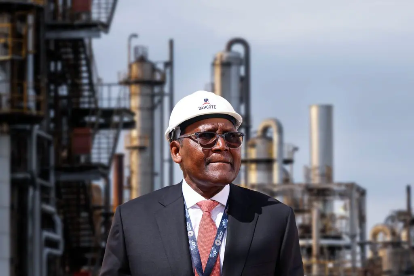
Petroleum marketers have said that President Bola Tinubu adopted the advice of Aliko Dangote, President of Dangote Group, in implementing the total removal of petrol subsidy.
President of the Petroleum Products Retail Outlets Owners Association, PETROAN, Billy Gillis-Harry disclosed this in an interview with DAILY POST.
Gillis-Harry was commenting on the latest hike of the fuel pump price by the Nigerian National Petroleum Company Limited, NNPCL, to N1,030 from N897.
The latest hike in fuel price is the third in two months.
According to Gillis-Harry, the continued adjustments in fuel pump prices showed that the Nigerian Government under Tinubu has listened to Dangote’s call for total subsidy removal.
He, however, did not fault the move to hike the fuel pump price as he said it was in line with the deregulation of the oil and gas sector, as provided by the Petroleum Industry Act.
“If indeed we listen to Aliko Dangote’s request in his Bloomberg interview on the fact that the President should remove subsidy completely and deregulate the downstream sector, maybe this is one step to ensuring that the Petroleum Industry Act is implemented,” he said.
Recall that in September 2024, Dangote in an interview with Bloomberg, called on the Nigerian government to completely remove fuel subsidy.
The hike in fuel pump prices has been condemned by the Nigeria Labour Congress, NLC.
Also, the Centre For the Promotion of Private Enterprise said Nigeria is not ripe for a full-blown deregulation of the petroleum industry.
You may like
If you are afraid of insecurity in your village to the extent you cannot live or operate from there, then you are not qualified to answer a Dibia, Ezenwanyi, Nze, Obi, Ezeani, Igwe.- Nze Tobe Osigwe
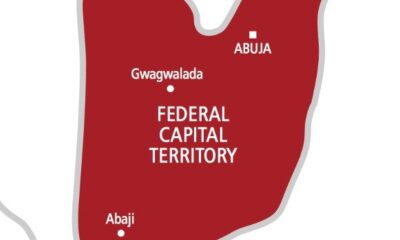

Abuja mother dumps baby by roadside
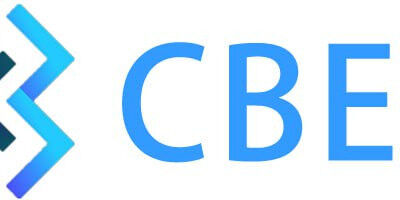

Trading platform users deny crash claim


GOOGLE’S $2 TRILLION STORY: FROM HUMBLE BEGINNINGS TO GLOBAL DOMINATION
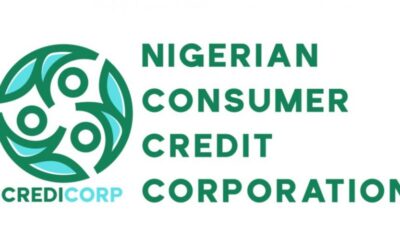

Nigerians score CrediCorp, power, agric ministries low
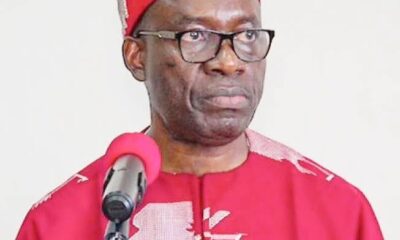

We must stop contaminating our rivers and streams in the name of ‘odinani’ (tradition)—- Gov Chukwuma Soludo
Business
Nigerians score CrediCorp, power, agric ministries low
Published
4 hours agoon
April 13, 2025By
Ekwutos Blog
Nigerians have rated the Ministries of Power and Agriculture and Food Security low on the Presidency’s Central Results Delivery Coordination Unit tracker, Sunday Ekwutos reports.
Data obtained by our correspondent from the tracker also revealed that the Ministry of Interior topped the chart, buoyed by multiple five-star reviews applauding improvements in passport and visa issuance.
On April 8, 2024, the Special Adviser to the President on Policy and Coordination and head of the CDCU, Hadiza Bala-Usma, inaugurated the Citizens’ Delivery Tracker.
Bala-Usman said the tracker would provide a “strong feedback loop” between citizens and the government and hold ministers and heads of government agencies accountable based on key deliverables.
“The Citizens Delivery Tracker App…will be constantly modified to enhance ease of use and maintain a strong feedback loop between citizens and their government,” she explained at the Go-Live event of the CDT in Abuja.
According to the latest CDCU data covering the last six months, citizens submitted 217 ratings overall, with an average of 3.1 out of 5 stars across agencies.
“The Ministry of Interior led with an average of 4.3, while the lowest-rated agency, the Nigerian Consumer Credit Corporation, recorded 1.7,” the report read.
Tinubu’s eight priority areas
The deliverables border on the eight priority areas of the Bola Tinubu administration.
The CDT outlined 204 deliverables and 888 indicators to assess government ministries, departments and agencies. The deliverables comprised various government policies, projects and programmes scheduled for completion between 2024 and 2027.
In arriving at the deliverables and key performance indicators, Bala-Usman said the CDCU, supported by development partners and consultants, held numerous bilateral meetings with all the ministers, permanent secretaries, and their respective technical teams for six weeks.
The tracker came months after President Bola Tinubu announced plans for ministerial assessment at the cabinet retreat in November 2023.
At the cabinet retreat for ministers, presidential aides, permanent secretaries and top government functionaries, Tinubu said the CDCU would be strengthened to make citizens an integral part of his government’s monitoring and performance management process.
Direct citizens’ feedback
A summarised breakdown of the feedback availed to Sunday Ekwutos indicated that fertiliser and other inputs did not get to real farmers because of the absence of a proper database.
“I suggest there should be agric extension workers across the 774 LGAs to collate the data and support; that way, genuine farmers will be reached, not paper ones,” Damilola Ogidan, who rated the Ministry of Agriculture and Food Security 2 out of 5, said.
Another respondent, Aimufua Emmanuel, in his rating of the Federal Ministry of Power, wrote, “Your excellency, I don’t know what we have done to God to give us a man like the power minister to take charge of the power sector. He’s by far the least performing minister in your cabinet. Ever since the beginning of this administration, our case has been from frying pan to fire. I live in Sangotedo, and since May last year, we have never had four hours of light in a day. At times we go one week without light blinking for a second, it is very obvious the power minister knows nothing about the power sector, listen to him and you’ll be quick to tell he knows nothing about generation, transmission and distribution of power. This man is clueless.’ He rated the Ministry of Power 1 out of 5.”
However, another Nigerian, Nasir Abubakar, rated the Power Ministry 4 out of 5.
He advised that there should be legislation that would compel power distribution companies to supply electricity to consumers and they should be responsible for the repairs and maintenance of their equipment.
The report continued: “One user, Lukman Kazeem, rated CrediCorp one star, commenting, ‘No indication that this agency is performing. No projects in the project list.’ The Delivery Manager for CrediCorp responded to clarify the agency’s status and ongoing initiatives.
“Oluwafemi Olanrewaju gave the Ministry of Interior five stars, commending ‘the improved processing time for visa issuance,” a key deliverable tied to the ministry’s priority.
“Feedback on the Federal Inland Revenue Service ranged from top marks to mid-level scores. Suleiman Umar rated the FIRS five out of five, stating, ‘I support Zach on his revenue reform…all MDA’s generating revenue should use FIRS account such that they don’t touch the revenue. Let’s have a centralised system of revenue collection.’”
“Segun Owolabi rated the FIRS three out of five, citing issues with taxpayer data: ‘The stats of captured taxpayers across Nigeria has not been consistently updated… many low-income earners are being taxed by their employer even when the law stipulates taxable and nontaxable income.”
CrediCorp recorded the lowest rating, averaging only 1.7 stars.
In the same timeframe, Priority 6—covering Health, Education, and Social Investment—achieved the best performance (74 per cent), while Priority 4—concerning Energy and Natural Resources—posted a comparatively lower figure (53 per cent).
During this period, delivery managers maintained an average response time of 3.2 days, with 30 actively engaging citizen feedback and resolving about 76 per cent of submitted issues.
The CDCU noted that the tracker’s 1 to 5 stars rating system was linked to verified performance indicators for each deliverable.
It encouraged citizens to rate and leave contextual feedback, which ministry representatives would address.
Business
PETROLEUM MINISTRY AND THREE AGENCIES UNDER ITS SUPERVISION PARTICIPATE IN IMF ARTICLE IV CONSULTATION
Published
21 hours agoon
April 12, 2025By
Ekwutos Blog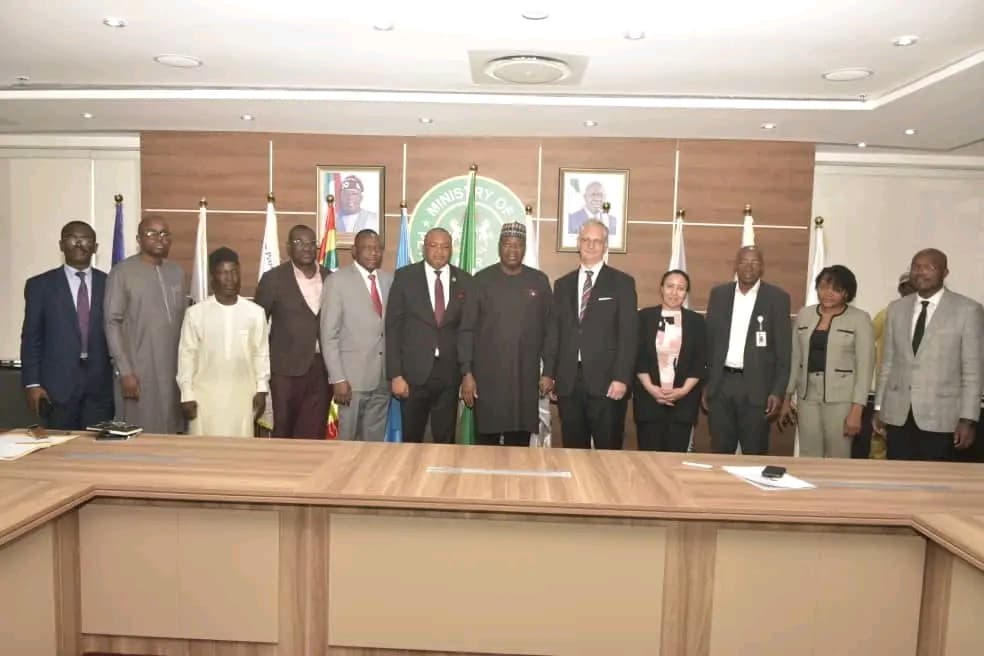
The Ministry of Petroleum Resources (MPR), alongside three agencies under its supervision—the Nigerian Upstream Petroleum Regulatory Commission (NUPRC), the Nigerian Midstream and Downstream Petroleum Regulatory Authority (NMDPRA), and the Nigerian National Petroleum Company Limited (NNPCL), recently participated in the ongoing International Monetary Fund (IMF) Article IV Consultation in Nigeria.
The IMF team was in the country at the invitation of the Federal Government to engage selected government institutions and gather insights on developments across various sectors of the economy.
Speaking during the meeting held in Abuja, the Chairman of the session and Permanent Secretary of the Ministry of Petroleum Resources, Ambassador Nicholas Agbo Ella, expressed appreciation to the IMF team for their continued efforts and commitment to the growth and development of the Nigerian economy, particularly the oil and gas sector.
Ambassador Ella encouraged representatives of NUPRC, NMDPRA, and NNPCL to engage fully in the consultation, stressing the importance of collaboration and innovation in achieving tangible economic outcomes.
During the meeting, the three agencies delivered comprehensive presentations, offering valuable insights into Nigeria’s crude oil production trends and projections. It was highlighted that despite prevailing challenges, the country achieved an average of 88% of its projected crude oil volume, attributed to reduced losses and increased output. Efforts are also underway to revive underperforming assets and improve output from flow stations to terminals.
Regarding gas production, the presentations underscored existing infrastructure developments and ongoing investments aimed at achieving production and distribution targets.
A significant part of the consultation examined the recent fuel subsidy removal by President Bola Ahmed Tinubu and the strategies being employed to ensure its long-term sustainability. Discussions reflected a shared commitment to market-driven reforms and enhanced fiscal responsibility within the petroleum sector.
Participants at the meeting agreed that strong inter-agency collaboration, along with support from development partners and financial institutions, is essential to stabilize global oil markets and strengthen Nigeria’s energy security.
The meeting was attended by Directors, Heads of Units, and staff from the Ministry of Petroleum Resources, representatives from the Federal Ministry of Finance, and IMF consultants.
This successful engagement reaffirmed Nigeria’s strategic commitment to transparency, sustainable growth, and international cooperation in the petroleum industry.
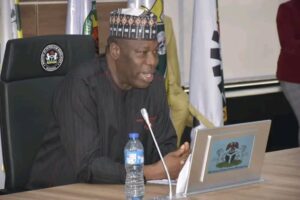
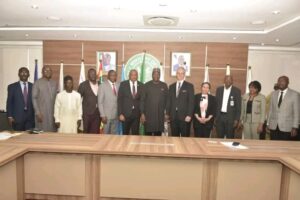

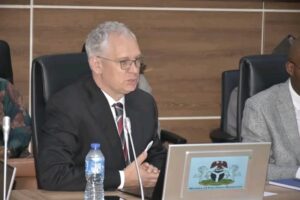
Business
AFDB REAFFIRMS $2.2 BILLION PLEDGE AS VP SHETTIMA COMMISSIONS 2ND SAPZ IN CROSS RIVER ** Says agro-industrial processing zones will empower farmers, attract investors, diversify Nigeria’s economy
Published
2 days agoon
April 10, 2025By
Ekwutos Blog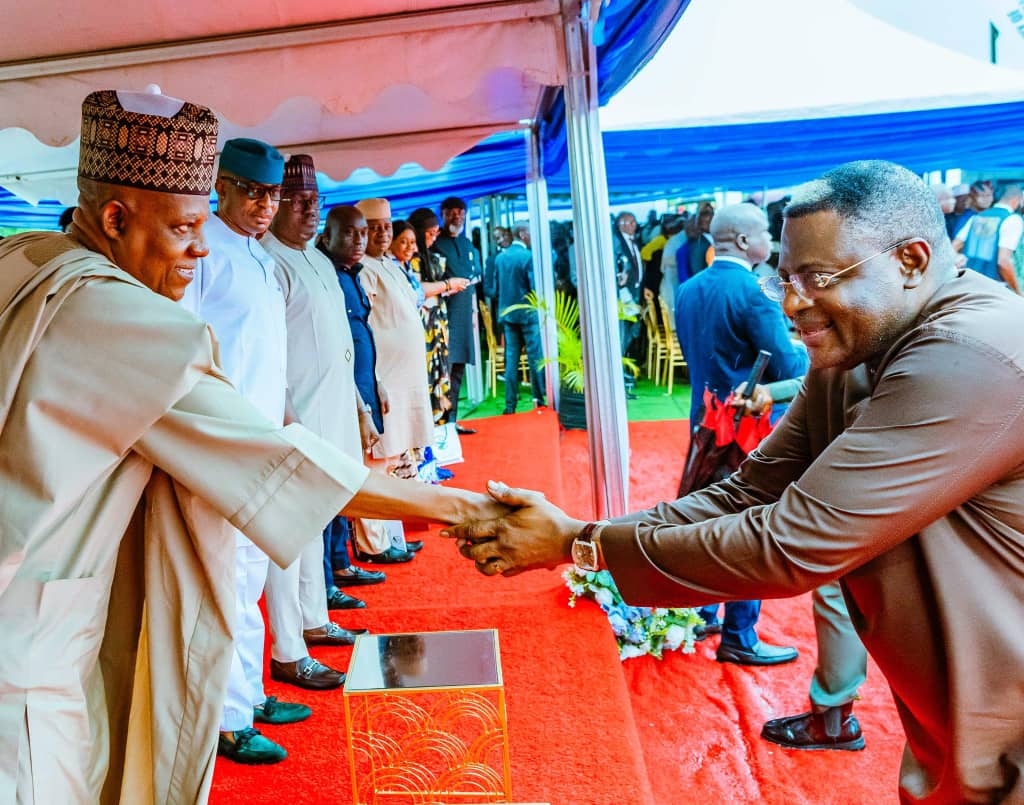
STATE HOUSE PRESS RELEASE
AFDB REAFFIRMS $2.2 BILLION PLEDGE AS VP SHETTIMA COMMISSIONS 2ND SAPZ IN CROSS RIVER
** Says agro-industrial processing zones will empower farmers, attract investors, diversify Nigeria’s economy
The federal government has commenced construction of the Special Agro-Industrial Processing Zone in Calabar, Cross River State, as part of a nationwide drive to transform the agricultural sector and stimulate inclusive economic growth across Nigeria.
This is the second of such a facility initiated within 72 hours after Vice President Kashim Shettima had on Tuesday performed the groundbreaking ceremony for the construction of the Kaduna State SAPZ in the Chikun local government area of the state.
Already, the AfDB_Group has reaffirmed its commitment to mobilising an additional $2.2 billion to execute the second phase of the SAPZ project across 28 states in Nigeria.
Speaking on Thursday when he performed the groundbreaking ceremony of SAPZ in Calabar, the Vice President described the project as “a game changer” that aligns with the President Tinubu administration’s Renewed Hope Agenda, aimed at diversifying the nation’s economy, addressing food security, tackling rural unemployment, as well as empowering farmers and the youth population.
“There is no intervention more practical in our dream of a nation where the potential of agriculture is maximised than what’s brought us together today. This isn’t just a project—it’s a bold vision to transform Nigeria’s agricultural value chain,” VP Shettima said.
According to him, the SAPZ initiative, supported with counterpart funding from development partners and the private sector, is designed to address challenges that have long hindered the growth of Nigeria’s agricultural economy, including inadequate processing infrastructure, limited access to markets, and rural unemployment.
“For far too long, our farmers have contended with poor infrastructure, lack of access to finance, and inadequate processing facilities. This zone is designed to confront those challenges head-on by creating an ecosystem where innovation, investment, and collaboration thrive,” he noted.
VP Shettima explained that the Calabar SAPZ will serve as a hub for agro-processing and storage, providing farmers and agripreneurs with critical infrastructure to scale their operations and tap into local and international markets.
“This is where farmers will meet with private investors, where ideas will turn into enterprise, and where our youth will find meaningful opportunities,” he said, disclosing that the Tinubu administration has classified SAPZ as a priority program in Nigeria’s quest for food security, with plans to institutionalize it as a government agency that will facilitate agricultural industrialization across all 36 states.
“These zones will generate thousands of jobs. They will create opportunities for young people, empower them with skills and knowledge to engage in meaningful work and help them contribute positively to the economy. Cross Riverians, development has come to your doorstep. For you and for the country, SAPZ is a game changer—one that will enable Nigeria to diversify its economy with a sustainable source.,” he stated.
Senator Shettima also expressed gratitude to key international development partners, including the African Development Bank, the Islamic Development Bank, and the International Fund for Agricultural Development, for their support and belief in Nigeria’s vision.
The Vice President commended Cross River State Governor, Senator Prince Bassey Edet Otu, for his collaboration, describing him as “a critical foundation for the success of this intervention and a great ally in development.”
Earlier, Cross River State Governor, Senator Otu, said the programme marked a watershed in the ongoing bid by his administration to establish the renewable resource base of the state through the full utilisation of agriculture and its multiple value chain.
Otu pointed out that in Cross River State, the establishment of a cluster of smallholder farmers in cash crops such as rice, cassava, millet, and cocoa across the state is the right step towards the agro-industrial revolution.
He said the paradigm shift from a non-renewable to a renewable resource base also holds the key to the prosperity of many nations, hence the imperative to join the league of sub-nationals in Nigeria that have adopted agriculture as the mainstay of their economy.
“The deliverables of the envisaged projects are food security, diversification of the state economy towards export-oriented trajectory and increase in the State’s GDP. When these projects are fully operational there is an expected robust collaboration with reputable agro-based processing institutes, universities and the rest, aimed at accelerating breakthroughs in many agro-industrial production.”
Also, Minister of Agriculture and Food Security, Senator Abubakar Kyari, said the programme would transform the agricultural production and agro-investment landscape in Nigeria under the Renewed Hope Agenda of President Tinubu.
Kyari thanked Vice President Shettima for his leadership and political backing at the highest level in the implementation of the SAPZ in Nigeria, just as he also commended the Governor of Cross River State for his commitment to ensuring that the state is among the front-running states that will commence the construction of their Agro-Industrial Processing Hub.
In his remark, President of AfDB, Dr Akinwumi Adesina, reiterated the bank’s pledge to mobilise $2.2 billion to execute the SAPZ project in 28 states across Nigeria.
Adesina observed that Cross River State has a significant role to play in Nigeria’s agricultural transformation because of the vast production of cocoa, cassava, rice and banana in the state, saying Obudu Cattle Ranch alone can turn the state into a huge livestock producer.
He also acknowledged that the state is ideal for SAPZ because it has an export processing zone, ports facility, and export handling capabilities, adding that the SAPZ in Calabar can easily be linked to the seaport for the transportation of processed agricultural commodities to the export market in neighbouring countries, including Cameroon and the rest.
“The African Development Bank, as you know, is spearheading this together with our partners, which include the Islamic Development Bank and the International Fund for Agricultural Development, and we have put together $934 million from the African Development Bank, with core financing of $938 million from these partners.
“The first phase of SAPZ in Nigeria will be in eight states of Cross River, Kaduna, Kano, Katsina, Oyo, Ogun, Kwara, Imo and the Federal Capital Territory. We are delighted with our partnership with the Islamic Development Bank and the International Fund for Agricultural Development.
“We have put together a financing package of $510 million to make this work. We expect, in the second phase of this, to mobilise $2.2 billion to be able to work for 28 states across the federation with several partners,” the AfDB President said.
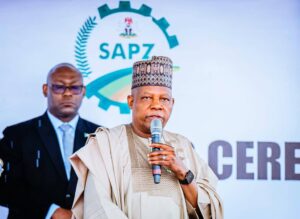

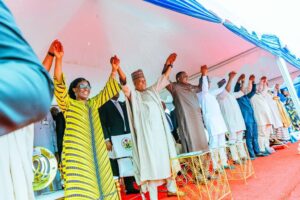
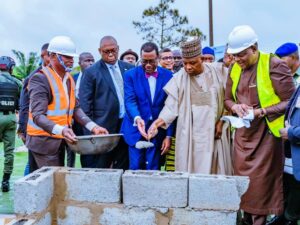

Stanley Nkwocha
Senior Special Assistant to The President on Media & Communications
(Office of The Vice President)
10th April, 2025
If you are afraid of insecurity in your village to the extent you cannot live or operate from there, then you are not qualified to answer a Dibia, Ezenwanyi, Nze, Obi, Ezeani, Igwe.- Nze Tobe Osigwe

Abuja mother dumps baby by roadside

Trading platform users deny crash claim
Trending

 Trending6 months ago
Trending6 months agoNYA demands release of ‘abducted’ Imo chairman, preaches good governance
- Business6 months ago
US court acquits Air Peace boss, slams Mayfield $4000 fine

 Politics6 months ago
Politics6 months agoMexico’s new president causes concern just weeks before the US elections
- Entertainment6 months ago
Bobrisky transferred from Immigration to FCID, spends night behind bars
- Entertainment6 months ago
Bobrisky falls ill in police custody, rushed to hospital

 Politics6 months ago
Politics6 months agoRussia bans imports of agro-products from Kazakhstan after refusal to join BRICS

 Politics6 months ago
Politics6 months agoPutin invites 20 world leaders
- Politics1 year ago
Nigerian Senate passes Bill seeking the establishment of the South East Development Commission.

